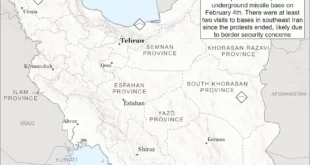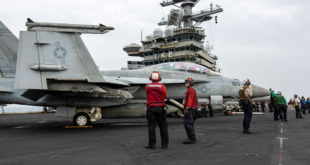Acting on a request from Iran, the International Atomic Energy Agency (IAEA) says it will send a team to Tehran as soon as possible to work jointly on a plan meant to clear up suspicions about the Islamic republic’s nuclear activities.The invitation, conveyed by a senior Iranian envoy and made public Monday by the agency, was portrayed by some diplomats as a positive step in IAEA attempts to learn more about past activities that could point towards a weapons programme.
But the US said it was sceptical. “I don’t think Iran’s track record is particularly noteworthy or particularly likely to give me or anyone else confidence that anything will come of these discussions,” US State Department spokesman Tom Casey said in Washington.
The invitation was linked to a recent Iranian offer to stop stonewalling the agency in its probe of more than two decades of Iranian nuclear activities — clandestine until 2002 when they were revealed by a dissident group.
If followed through, it could generate international goodwill that might blunt the threat of new UN sanctions and increase pressure on the US and its closest allies to compromise on their insistence for a full enrichment freeze.
Besides demanding such a freeze — and answers to the IAEA’s questions — the Security Council wants Tehran to stop building a plutonium-producing reactor.
Tehran’s refusal to provide answers originally prompted the council to get involved. Since December, it has imposed two sets of sanctions and has begun informal consultations on new penalties because of Tehran’s nuclear defiance.
Iran says it wants to develop enrichment only to generate power. But its stonewalling of the IAEA has heightened suspicions that it wants to enrich uranium for use as the fissile core of warheads.
Meeting Sunday with IAEA head Mohammad Al Baradei, Ali Larijani, Tehran’s chief nuclear negotiator, “invited the IAEA to send a team to Tehran to develop an action plan for resolving outstanding issues related to Iran’s past nuclear programme,” said agency spokeswoman Melissa Fleming, adding: “The IAEA intends to send a team as early as practicable.” Tehran’s offer to deal with outstanding questions was also the focus of talks Saturday between Larijani and top EU foreign policy envoy Javier Solana.
A European diplomat said the decision to invite an IAEA delegation was reached at those talks and that Larijani had asked for 120 days to clear up ambiguities — a time span that Solana rejected as too long.
Asked what Solana considered reasonable, the diplomat, who demanded anonymity in exchange for discussing the confidential talks, told The Associated Press: “Weeks — and not very many.” Iran has said before that it was ready to cooperate with the IAEA on the issue of unexplained past activities but has yet to deliver. Still, a diplomat familiar with Iran’s nuclear file described the offer as “the first break in the [nuclear] stalemate in months.” The unanswered questions include: traces of enriched uranium at a facility linked to the military — a possible sign of a hidden weapons programme — and possession of documents showing how to mold uranium metal into the form of missile warheads.
Multilateral talks with Iran broke off in August 2005 after Tehran rejected an offer of political and economic incentives in exchange for long-term enrichment suspension.
Since then, Iran has repeatedly said an enrichment freeze was out of the question, while the six world powers insisted they would accept nothing less before resuming negotiations.
The Solana-Larijani talks are an attempt to find common ground that would allow such talks to restart. Because of the standoff over enrichment, the two are skirting the issue and are instead focusing on Iran’s offer to be more open with the IAEA.
There are recent indications of potential differences on the enrichment issue. US and European diplomats and government employees told the AP last week that Britain, France and Germany are informally debating the possibility of only a partial freeze.
With permanent members Russia and China only reluctantly backing sanctions, any loss of European support for a full freeze would leave Washington with the hard choice of either backing down or being isolated.
Germany was supportive, France opposed and Britain noncommittal, the officials said.
US Secretary of State Condoleezza Rice on Sunday dismissed as “chatter” discussions among US allies about a new approach.
But an American official told the AP “there is some truth” to the reports. And the European diplomat said that any serious attempt by Iran to answer outstanding questions “will have an impact” on the enrichment issue.
 Eurasia Press & News
Eurasia Press & News



